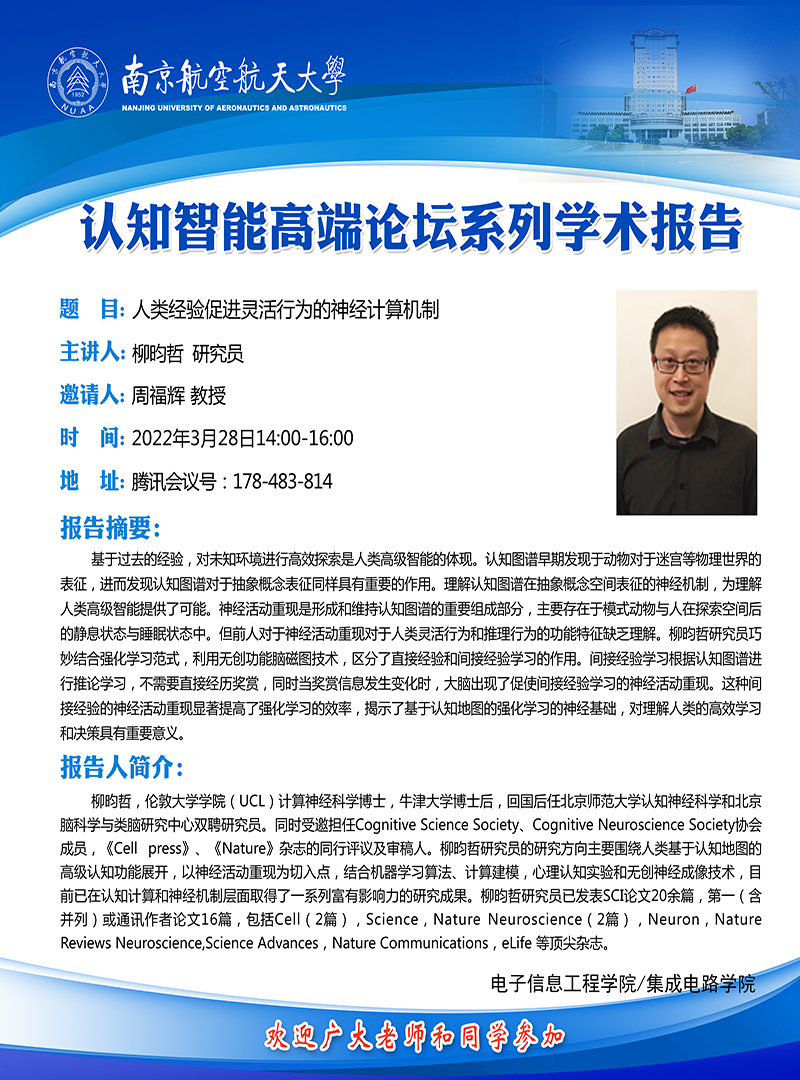
周福辉 国家优青,南京航空航天大学电子信息工程学院教授、博导,“面向航空航天的协同智能信息处理学科”111国家创新引智基地副主任,IEEE Senior Member。一直从事认知智能和多域资源智能优化理论与方法的研究,至今已在国际通信权威期刊或会议发表论文170余篇,入选ESI热点和高被引论文13篇,申请发明专利30余项,已授权20余项;作为主持人或课题负责人至今承担了包括国家重点研发重大项目课题、国家自然科学基金优青、重点、面上和青年基金、江西省自然科学杰出青年基金等20余个国家级或省部级课题,科研经费累计超过2000万元。已入选斯坦福全球顶尖科学家榜单、爱思唯尔高被引学者、IEEE通信学会亚太地区杰出青年学者奖、国际无线电联盟青年科学家奖、中国科协“青年人才托举工程”、“江苏省333人才培养工程”、“江西省杰出青年基金”、“江西省高层次人才”、南京航空航天大学“长空英才”等人才计划,荣获江西省自然科学奖一等奖,E&T全球创新奖、日内瓦国际发明展金奖、中国发明协会发明创业奖创新奖一等奖等省部级和国际奖励。目前,担任国际通信权威期刊IEEE TCOM、IEEE Systems Journal、IEEE WCL等通信领域权威期刊编委,作为会议共同主席(co-chair)组织了IEEE ICC Workshop 2019和IEEE Globecom Workshop。
Fuhui Zhou received the B.S degree in Information Engineering from East China Jiaotong University, Jiangxi, China, in 2010. He started his M. S. E. degree in Telecommunications and Systems in 2011 and received his Ph. D. degree in Wireless Communications in 2016. His supervisor is Prof. Zan Li. From 2015 to 2016, he was a visiting student at University of British Columbia, supported by the CSC fund. From July 2016 to Sept. 2019, he worked at Nanchang University as an associate professor. From Aug. 2017-June 2018, he has been a research fellow at Utah State University at Prof. Rose Qingyang Hu’s Lab. Since July 2018, he has been a senior research fellow at Prof. Rose Qingyang Hu’s Lab. Now, he is a full professor in Nanjing University of Aeronautics and Astronautics.
His current research interests include Cognitive intelligence fundmental theory, Cognitive intelligence and knowledge graph, Radio frequency machine learning, Intelligent spectrum management and control and robust resource optimization and Intelligent and anti-intelligent theory and algorithm. He has published over 100 Journal and conference papers on these topics, including IEEE Journal of Selected Areas in Communications, IEEE Wireless Communications,IEEE Transactions on Wireless Communications, IEEE Network, IEEE Wireless Communications Letters, IEEE Globecom, IEEE ICC, IEEE PIRMC, etc,.

 A wideband cognitive radio network relying on energy harvesting is studied under a practically non-linear energy harvesting model. In order to efficiently exploit the harvesting energy and enhance the performance of the secondary users (SUs), an intelligent resource allocation scheme based on deep reinforcement learning is proposed.
A wideband cognitive radio network relying on energy harvesting is studied under a practically non-linear energy harvesting model. In order to efficiently exploit the harvesting energy and enhance the performance of the secondary users (SUs), an intelligent resource allocation scheme based on deep reinforcement learning is proposed.



